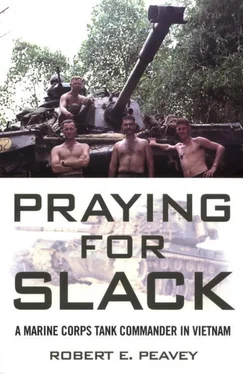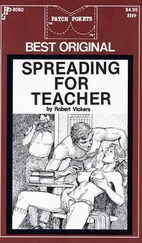Occasionally, G-2, the division intelligence section, alerted the battalion to expect a possible attack on a given night. Such warnings guaranteed two things: first, that we’d get only four hours’ sleep because half the crew would have to be up and ready all through the night; and, second, that we wouldn’t get hit at all! G-2 was not known for its reliable intelligence.
There were hot showers within a short walking distance of our tents, and the mess tent was nearby too. We had left behind the luxury of the movies and the NCO Club, but—naively—I began to think this wasn’t so bad, that I could handle the twelve months that lay ahead. I had no idea how lucky we had been so far.
The first day of our arrival at the fire base, several men sought us out to say hello. These were ex-tankers who had been plucked from 5th Tanks at Camp Pendleton to fill grunt positions. They immediately recognized the presence of several strange faces in our platoon. When we told them these were amtrackers who had taken their place, they became justifiably enraged. Who could blame them?
One of these former tankers was a friend of mine—I’d been best man at his wedding only three months earlier—who gave me some first-hand scoop on just how bad it was to be a grunt. “The worst things are the booby traps,” he said. They had already lost several men since arriving in-country a month earlier. He was afraid that as a grunt he would never make it out alive, that the odds were stacked against him. “It’s only a matter of time,” he told me. Like all the other ex-tankers, he wanted to get back into a tank outfit in the worst way. Several months later, I learned that he didn’t make it after all. His story read like a script from a cheap Hollywood war movie, where the guy just knows he’s going to get it—and does.
During the day, there was an endless list of details you could get assigned to, but I never got stuck with any of them. True to form, I owed my “luck” to Embesi. He was watching out for me; my getting assigned to the platoon sergeant’s tank wasn’t just a stroke of luck, after all. Embesi usually saved the really bad chores, like burning the shifters or mess duty, for disciplinary cases. Burning the shifters was a morning routine all over Vietnam. It meant dragging the collection cans from the outhouses, adding diesel fuel, and lighting the contents. Just what the purpose was is still a mystery to me today; the practice continues, even through the war in Iraq.
Embesi called the group of troublemakers his “shit-birds,” men who always seemed to be on the edge, trying to see what they could get away with, getting into some kind of trouble and waiting for Embesi to bail them out. He stood behind his men but made them pay for it later with the lousy jobs.
At the head of the list for platoon troublemaker was Cpl. Gary Gibson, a round peg looking for a square hole. Gary was a really good guy, dependable under fire; he knew what he was doing but was always trying to see what he could get away with. His mouth and Irish temper often got him into trouble.
Gary had served with Embesi during a previous tour in The Nam. One night, while standing watch in the field, Embesi told me a story about Gibson and another guy stealing some food from the mess hall, late one night.
The two men had managed to sneak inside and put together quite a stash before the mess hall’s gunnery sergeant caught them. Fuming and wanting justice, the gunny demanded to know what unit they were from, then asked for their platoon sergeant to be summoned to the mess hall.
When Embesi arrived, he acted surprised and disgusted, and verbally dressed the two men down. Then he told the gunny that he’d like to punish the men right then and there. Would the gunny stand outside the mess hall door and keep a look out for any officers? The gunny was from the Old Corps, so he watched Embesi roll up his sleeves; he knew exactly what this young sergeant had in mind. That suited the gunny just fine—those two deserved a good ass-whipping.
Embesi grabbed the two men by their collars, flung them into the mess hall, and snarled, “I’m gonna make sure you don’t do this again!” The gunny just smiled and stood guard in front of the door, listening to the gratifying sounds of a full-blown brawl. Embesi was beating the tar out of them. Chairs were thrown, fists connected with flesh, bodies crashed on the mess hall deck. Against Embesi, a multi-degreed black belt in karate, they didn’t stand a chance.
It was all over in a few minutes. Embesi dragged the moaning figures out of the mess hall; they were holding their faces in their hands. “They won’t be doing that again!” he promised the gunny, as he took the two in tow. Satisfied with their punishment, the gunny dropped the charges against the pair that had violated his mess hall. Unbeknownst to him, Embesi never laid a hand on his men; he just bailed them out the best way he knew how. He staged the entire fight!
You had to like a guy like that. He didn’t let any outsider impact the men under his command. You didn’t get away with anything and the administration of any discipline stayed within the platoon.
BUILDING THE AMMO BUNKER was exhausting work. At lunchtime it was too damned hot to eat, and several of us preferred to rack out. About six of us were lying on our cots when Corporal Gibson dreamed up a prank to pull on our new lieutenant (LT). We had picked him up when we left 1st Tank Battalion, and nobody had much respect for him. After all, he was a second lieutenant and didn’t know diddly squat about tanks or The Nam.
Gary got hold of the LT’s poncho liner. These liners were relatively new to Vietnam. Made of a soft nylon material with a camouflage pattern, they also served as blankets and were prized by everyone. Gary filled a small cup with battery acid and, as if it was Holy Water, sprinkled it all over the liner. Once he finished blessing the blanket, he folded it up and put it back at the head of the LT’s cot, right where he found it.
That night, the crews were all out on the berm with their tanks. Several days later, I heard the rest of the story from Embesi.
After playing cards, Embesi and the lieutenant decided to turn in. The lieutenant’s cot lay near the entrance to the tent. A single lightbulb hung from the tent’s center beam. Facing the light, the LT shook open his blanket. The shadowed side of the blanket was pierced by dozens of beams of light streaming in from the bare bulb.
The LT stood there, dumbfounded, looking at what appeared to be a giant slice of camouflaged Swiss cheese. “S-s-s-ergeant Embesi!” he stuttered, “What happened to my poncho liner?”
Embesi knew what—the LT’s blanket had fallen victim to an old tanker’s practical joke. “Moths, sir?” he asked.
“Moths that eat nylon?” The lieutenant was really pissed; he knew somebody had messed with his blanket. “There’s a chemical smell to it, but I can’t tell what it is.”
Embesi took a sniff to confirm his own suspicion—but he never shared it with the LT. He also had a pretty good idea who the culprit was, because he had supplied Gary with the battery acid earlier that afternoon for his tank. But he kept that to himself. He simply promised the whiny lieutenant that he would get him a new blanket.
Gary Gibson had made Embesi’s shit list once again.
Every war has its own nickname for the infantryman. World War I had its Doughboys. World War II had its GIs. “Grunt” was my generation’s term for the combat infantryman. No better term could have been found for this war, in this ungodly hot country where men in the field had to pack eighty to one hundred pounds of gear on their backs. “Grunt” said it all.
Читать дальше












